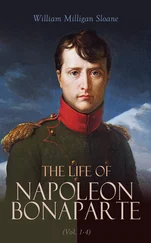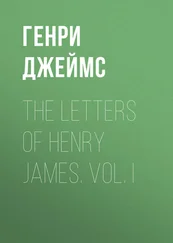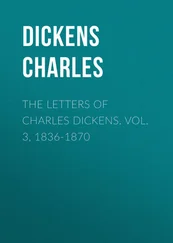William James - The Letters of William James, Vol. 2
Здесь есть возможность читать онлайн «William James - The Letters of William James, Vol. 2» — ознакомительный отрывок электронной книги совершенно бесплатно, а после прочтения отрывка купить полную версию. В некоторых случаях можно слушать аудио, скачать через торрент в формате fb2 и присутствует краткое содержание. Жанр: Биографии и Мемуары, Философия, foreign_edu, foreign_antique, на английском языке. Описание произведения, (предисловие) а так же отзывы посетителей доступны на портале библиотеки ЛибКат.
- Название:The Letters of William James, Vol. 2
- Автор:
- Жанр:
- Год:неизвестен
- ISBN:нет данных
- Рейтинг книги:3 / 5. Голосов: 1
-
Избранное:Добавить в избранное
- Отзывы:
-
Ваша оценка:
- 60
- 1
- 2
- 3
- 4
- 5
The Letters of William James, Vol. 2: краткое содержание, описание и аннотация
Предлагаем к чтению аннотацию, описание, краткое содержание или предисловие (зависит от того, что написал сам автор книги «The Letters of William James, Vol. 2»). Если вы не нашли необходимую информацию о книге — напишите в комментариях, мы постараемся отыскать её.
The Letters of William James, Vol. 2 — читать онлайн ознакомительный отрывок
Ниже представлен текст книги, разбитый по страницам. Система сохранения места последней прочитанной страницы, позволяет с удобством читать онлайн бесплатно книгу «The Letters of William James, Vol. 2», без необходимости каждый раз заново искать на чём Вы остановились. Поставьте закладку, и сможете в любой момент перейти на страницу, на которой закончили чтение.
Интервал:
Закладка:
To James J. Putnam
Dear Jim,—Thanks for your noble-hearted letter, which makes me feel warm again. I am glad to learn that you feel positively agin the proposed law, and hope that you will express yourself freely towards the professional brethren to that effect.
Dr. Russell Sturgis has written me a similar letter.
Once more, thanks!
W. J.P.S. March 3. The "Transcript" report, I am sorry to say, was a good deal cut. I send you another copy, to keep and use where it will do most good. The rhetorical problem with me was to say things to the Committee that might neutralize the influence of their medical advisers, who, I supposed, had the inside track, and all the prestige . I being banded with the spiritists, faith-curers, magnetic healers, etc., etc. Strange affinities! 19 19 James J. Putnam to William James Boston, Mar. 9, 1898 . Dear William,—We have thought and talked a good deal about the subject of your speech in the course of the last week. I prepared with infinite labor a letter intended for the Transcript of last Saturday, but it was not a weighty contribution and I am rather glad it was too late to get in. I think it is generally felt among the best doctors that your position was the liberal one, and that it would be a mistake to try to exact an examination of the mind-healers and Christian Scientists. On the other hand, I am afraid most of the doctors, even including myself, do not have any great feeling of fondness for them, and we are more in the way of seeing the fanatical spirit in which they proceed and the harm that they sometimes do than you are. Of course they do also good things which would remain otherwise not done, and that is the important point, and sincere fanatics are almost always, and in this case I think certainly, of real value. Always affectionately, James J. P.
To François Pillon
My dear Pillon,—I have just received your pleasant letter and the Année , volume 8, and shall immediately proceed to read the latter, having finished reading my examinations yesterday, and being now free to enjoy the vacation, but excessively tired. I grieve to learn of poor Mrs. Pillon's continued ill health. How much patience both of you require. I think of you also as spending most of the summer in Paris, when the country contains so many more elements that are good for body and soul.
How much has happened since I last heard from you! To say nothing of the Zola trial, we now have the Cuban War! A curious episode of history, showing how a nation's ideals can be changed in the twinkling of an eye, by a succession of outward events partly accidental. It is quite possible that, without the explosion of the Maine, we should still be at peace, though, since the basis of the whole American attitude is the persuasion on the part of the people that the cruelty and misrule of Spain in Cuba call for her expulsion (so that in that sense our war is just what a war of "the powers" against Turkey for the Armenian atrocities would have been), it is hardly possible that peace could have been maintained indefinitely longer, unless Spain had gone out—a consummation hardly to be expected by peaceful means. The actual declaration of war by Congress, however, was a case of psychologie des foules , a genuine hysteric stampede at the last moment, which shows how unfortunate that provision of our written constitution is which takes the power of declaring war from the Executive and places it in Congress. Our Executive has behaved very well. The European nations of the Continent cannot believe that our pretense of humanity, and our disclaiming of all ideas of conquest, is sincere. It has been absolutely sincere! The self-conscious feeling of our people has been entirely based in a sense of philanthropic duty, without which not a step would have been taken. And when, in its ultimatum to Spain, Congress denied any project of conquest in Cuba, it genuinely meant every word it said. But here comes in the psychologic factor: once the excitement of action gets loose, the taxes levied, the victories achieved, etc., the old human instincts will get into play with all their old strength, and the ambition and sense of mastery which our nation has will set up new demands. We shall never take Cuba; I imagine that to be very certain—unless indeed after years of unsuccessful police duty there, for that is what we have made ourselves responsible for. But Porto Rico, and even the Philippines, are not so sure. We had supposed ourselves (with all our crudity and barbarity in certain ways) a better nation morally than the rest, safe at home, and without the old savage ambition, destined to exert great international influence by throwing in our "moral weight," etc. Dreams! Human Nature is everywhere the same; and at the least temptation all the old military passions rise, and sweep everything before them. It will be interesting to see how it will end.
But enough of this!—It all shows by what short steps progress is made, and it confirms the "criticist" views of the philosophy of history. I am going to a great popular meeting in Boston today where a lot of my friends are to protest against the new "Imperialism."
In August I go for two months to California to do some lecturing. As I have never crossed the continent or seen the Pacific Ocean or those beautiful parages , I am very glad of the opportunity. The year after next ( i.e. one year from now) begins a new year of absence from my college duties. I may spend it in Europe again. In any case I shall hope to see you, for I am appointed to give the "Gifford Lectures" at Edinburgh during 1899-1901—two courses of 10 each on the philosophy of religion. A great honor.—I have also received the honor of an election as "Correspondent" of the Académie des Sciences Morales et Politiques. Have I your influence to thank for this? Believe me, with most sympathetic regards to Mrs. Pillon and affectionate greetings to yourself, yours most truly
WM. JAMES.Before starting for California, James went to the Adirondack Lodge to snatch a brief holiday. One episode in this holiday can best be described by an extract from a letter to Mrs. James.
To Mrs. James
I have had an eventful 24 hours, and my hands are so stiff after it that my fingers can hardly hold the pen. I left, as I informed you by post-card, the Lodge at seven, and five hours of walking brought us to the top of Marcy—I carrying 18 lbs. of weight in my pack. As usual, I met two Cambridge acquaintances on the mountain top—"Appalachians" from Beede's. At four, hearing an axe below, I went down (an hour's walk) to Panther Lodge Camp, and there found Charles and Pauline Goldmark, Waldo Adler and another schoolboy, and two Bryn Mawr girls—the girls all dressed in boys' breeches, and cutaneously desecrated in the extreme from seven of them having been camping without a male on Loon Lake to the north of this. My guide had to serve for the party, and quite unexpectedly to me the night turned out one of the most memorable of all my memorable experiences. I was in a wakeful mood before starting, having been awake since three, and I may have slept a little during this night; but I was not aware of sleeping at all. My companions, except Waldo Adler, were all motionless. The guide had got a magnificent provision of firewood, the sky swept itself clear of every trace of cloud or vapor, the wind entirely ceased, so that the fire-smoke rose straight up to heaven. The temperature was perfect either inside or outside the cabin, the moon rose and hung above the scene before midnight, leaving only a few of the larger stars visible, and I got into a state of spiritual alertness of the most vital description. The influences of Nature, the wholesomeness of the people round me, especially the good Pauline, the thought of you and the children, dear Harry on the wave, the problem of the Edinburgh lectures, all fermented within me till it became a regular Walpurgis Nacht. I spent a good deal of it in the woods, where the streaming moonlight lit up things in a magical checkered play, and it seemed as if the Gods of all the nature-mythologies were holding an indescribable meeting in my breast with the moral Gods of the inner life. The two kinds of Gods have nothing in common—the Edinburgh lectures made quite a hitch ahead. The intense significance of some sort, of the whole scene, if one could only tell the significance; the intense inhuman remoteness of its inner life, and yet the intense appeal of it; its everlasting freshness and its immemorial antiquity and decay; its utter Americanism, and every sort of patriotic suggestiveness, and you, and my relation to you part and parcel of it all, and beaten up with it, so that memory and sensation all whirled inexplicably together; it was indeed worth coming for, and worth repeating year by year, if repetition could only procure what in its nature I suppose must be all unplanned for and unexpected. It was one of the happiest lonesome nights of my existence, and I understand now what a poet is. He is a person who can feel the immense complexity of influences that I felt, and make some partial tracks in them for verbal statement. In point of fact, I can't find a single word for all that significance, and don't know what it was significant of, so there it remains, a mere boulder of impression . Doubtless in more ways than one, though, things in the Edinburgh lectures will be traceable to it.
Читать дальшеИнтервал:
Закладка:
Похожие книги на «The Letters of William James, Vol. 2»
Представляем Вашему вниманию похожие книги на «The Letters of William James, Vol. 2» списком для выбора. Мы отобрали схожую по названию и смыслу литературу в надежде предоставить читателям больше вариантов отыскать новые, интересные, ещё непрочитанные произведения.
Обсуждение, отзывы о книге «The Letters of William James, Vol. 2» и просто собственные мнения читателей. Оставьте ваши комментарии, напишите, что Вы думаете о произведении, его смысле или главных героях. Укажите что конкретно понравилось, а что нет, и почему Вы так считаете.












